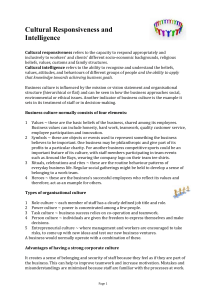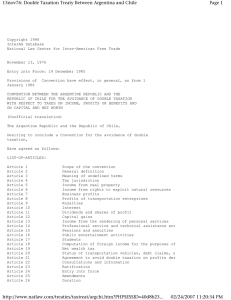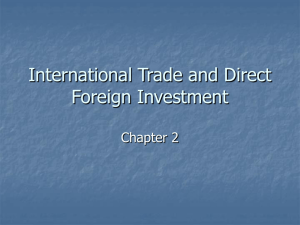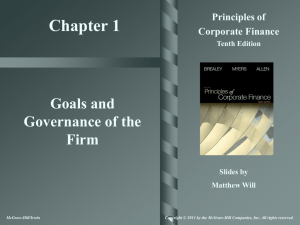Taxation of multinationals and the ECJ Stephen Bond Institute for Fiscal Studies
advertisement
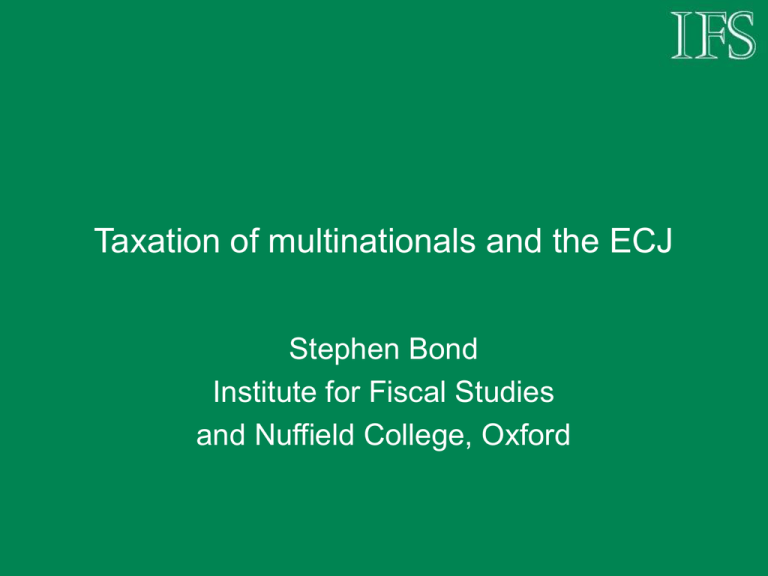
Taxation of multinationals and the ECJ Stephen Bond Institute for Fiscal Studies and Nuffield College, Oxford Taxation of international companies • How should we tax foreign-source income of UK companies? • i.e. income from their subsidiaries outside the UK • Background • two ECJ cases decided in 2006 • review of taxation of foreign profits announced in December 2006 PBR • Developments in corporate tax rates in other EU countries Recent ECJ Cases • Cadbury Schweppes (13 September 2006) • concerns anti-avoidance rules for ‘Controlled Foreign Companies’ • affects taxation of profits of overseas subsidiaries in limited circumstances • Franked Investment Income Group Litigation (12 December 2006) • concerns taxation of dividend income from overseas subsidiaries more generally Cadbury Schweppes case • Overseas subsidiaries of UK companies are not normally subject to UK corporation tax • Dividends received by UK companies from overseas subsidiaries are normally subject to UK corporation tax • with credit given for foreign corporate tax paid by the subsidiary on the underlying profits • Allows deferral of taxation at the UK rate, where profits are retained in overseas subsidiaries in countries with lower CT rates Cadbury Schweppes case • Controlled Foreign Companies (CFC) rules limit this deferral benefit to parent companies • Profits of subsidiaries that are • located in low CT rate countries • not considered to be normal commercial entities • May be apportioned back to UK and taxed as income of the parent company • Primarily used against ‘tax haven’ countries, outside the EU Cadbury Schweppes case • UK government sought to apply CFC rules against two subsidiaries of Cadbury Schweppes located in Ireland • ECJ ruled that this breached the right to freedom of establishment in EC Treaty • CFC rules can be applied against other EU member states, but only when subsidiaries are ‘wholly artificial arrangements aimed solely at escaping national tax normally due’ Cadbury Schweppes case • ECJ ruling weakens the conditions that subsidiaries in other EU member states must meet to be treated as normal commercial entities • December 2006 PBR announced changes to UK CFC rules to comply with this ruling • May allow UK (and other EU) multinational firms to make more effective use of non-EU tax havens • using EU countries with weaker CFC regimes Franked Investment Income case • Two common systems of cross-border double tax relief for dividends paid by subsidiaries to parent companies • Credit method (UK, USA) • Exemption method (most EU countries) • ECJ case addressed legality of the credit method as it operates in the UK Franked Investment Income case • Credit method • a UK firm that invests in Ireland pays corporation tax at 12.5% in Ireland on profits of the Irish subsidiary • dividends paid from the Irish subsidiary to the UK parent are subject to UK corporation tax at 30%, with credit given for corporation tax paid by the Irish subsidiary to the Irish government on the underlying profits Franked Investment Income case • Exemption method • a German firm that invests in Ireland pays corporation tax at 12.5% in Ireland on profits of the Irish subsidiary • dividends paid from the Irish subsidiary to the German parent are exempt from corporate income tax in Germany Franked Investment Income case • As a result, a UK firm investing in Ireland may face a higher overall corporate tax charge than a German firm investing in Ireland • This difference in tax treatments is not inconsistent with EU law • national governments may choose to handicap their own firms operating in other member states • both credit and exemption systems are recognised in the EU Parent-Subsidiary Directive (July 1990) Franked Investment Income case • However UK corporation tax applies the credit method to dividends received by parent companies from overseas subsidiaries • But exempts dividends received by parent companies from domestic subsidiaries • The legality of these different tax treatments for domestic and foreign subsidiaries was questioned in the FII case Franked Investment Income case • Interim Opinion of the ECJ’s Advocate General, published 6 April 2006, suggested this aspect of the operation of the credit method in the UK may be contrary to EU law • ECJ ruling on 12 December 2006 indicates that different procedures can be used, provided they result in comparable tax charges • Case referred back to UK High Court to decide whether or not this applies Taxation of foreign profits • Developments in this case during 2006 required UK government to consider how it would respond if some elements of the existing credit system were ruled to be in breach of EU law • December 2006 PBR announced that a consultation process to consider possible reforms to the taxation of foreign profits will be conducted during 2007 Taxation of foreign profits • This review is important, as international companies account for a growing share of economic activity • Outcome could influence whether the UK remains an attractive location of residence for major multinational companies • Scope is not yet clear, but should be wideranging and consider the case for moving to an exemption system Taxation of foreign profits • How serious a handicap is the credit system for UK companies that operate internationally? • Difficult to say • Many international firms operate successfully from the UK Taxation of foreign profits • What would be the revenue cost of exempting foreign-source dividends? • Difficult to say • Large firms can avoid UK tax on foreignsource dividends by • retaining profits in overseas subsidiaries • routing dividend payments through subsidiaries located in countries with higher CT rates (in which case the credit available wipes out the UK corporation tax liability) Taxation of foreign profits • How could any revenue cost be recouped? • Tempting to restrict interest deductibility: why should interest payments on debt used to fund overseas investment be deductible against UK corporation tax, if profits of overseas subsidiaries are exempt from UK corporation tax? • But impossible to determine which borrowing funds which investment: ‘interest allocation rules’ tend to be both complex and arbitrary Taxation of foreign profits • Major attraction of the exemption method would be potential for simplicity • But hard to be confident that a package of an exemption system with interest allocation rules would be simpler than the present credit system Corporate tax rates • Concerns over the ‘competitiveness’ of UK corporation tax also stem from recent developments in corporate tax rates • Particularly in other EU countries Corporate tax rates • 1997 • UK CT rate at 33% • 4th lowest of the 15 EU countries • 1999 • UK CT rate at 30% • still 4th lowest of the 15 EU countries • Jan 2007 • UK CT rate still at 30% • now 6th highest of the EU-15 • all new member states have lower CT rates except Malta Corporate tax rates • Unlikely that the UK corporate tax regime in 2007 appears as attractive to firms contemplating investments in Europe as it would have done, compared to other EU locations, a decade earlier • Hence growing concerns about the impact of UK corporation tax on business investment and location choices Summary • Announced review of the taxation of foreign profits is important and should be wideranging • Corporate tax rates have fallen faster in other EU countries than in the UK over the last decade, and particularly since 1999
